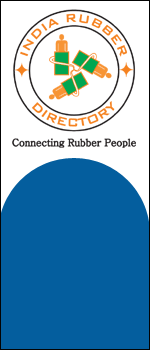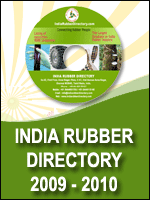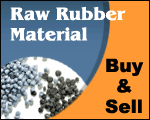Research Institute In India
University of Madras - Departments
Department of Polymer Science
Guindy Campus
Chennai
22200573, 22351259, 22351367, 22350401,
22200572, 22351137, 22200570, 22200574 Ext No: 228
The History
The intense specialisation of the Department on Polymers has resulted in the
creation of Department of Polymer Science in 1983 Keen research of this
department pertain to synthesis of dendritic and hyper-branched polymers,
Ziegler-Natta Polymerization, Polyurethanes, Polymer Chemistry, modification of
Polymers, Synthesis and characterisation of new polymers and bio-polymers.
The consultancy potential of the department exists in the areas of
Polyurethanes, Polymer synthesis, Polymer composites and metal containing
polymers.
Infrastructure
Well equiped laboratory including, electronic analytical balance, rotary
evaporator, computers, etc.
Courses Offered
M.Sc. in Polymer Science
Faculties
Dr. A. Sultan Nazar, Ph.D
Reader and Head i/c
Dr. Harichandran, Ph.D
Lecturer
For More Details : http://www.unom.ac.in/
Indian Institute Of Technology Delhi
Polymer Science & Engineering
The Centre for Polymer Science and Engineering, IIT Delhi is one of the
foremost and best in the country in terms of the expertise and facilities
available for fundamental research and teaching in the emerging area of
Polymers and other related interdisciplinary areas. The Principal thrust of
the Centre are manpower development and research for enhancing the
fundamental knowledge as well as developing new polymer materials.
Undergraduate Programs
| Course Code |
Courses |
Credits |
PS 391M
PS 392M
PS 490M
PS 493M
PS 494M
EP 492S
PS 496M
PS 498M
|
Introduction To Polymeric Materials
Rheology And Processing Of Polymers
Polymerisation Processes And Kinetics
Performance Properties Of Polymers
High Performance Polymers
Major Project Part2
Design Of Products And Mould/Dies For Plastics
Polymer And Rubber Technology
|
3-1-0
3-1-0
3-1-0
3-1-0
3-1-0
0-0-14
3-1-0
3-1-0
|
Postgraduate Programs
Interdisciplinary M.Tech in Polymer Science And Technology
Madras Institute Of Technology
Rubber And Plastic Technology Department
The division of Rubber Technology at MIT Campus of Anna University was started
in the year 1988. It offers a B.Tech., Degree Course in Rubber Technology. The
curriculum is so structured as to impart a good blend of knowledge in science,
engineering and management skills to the students. Six weeks of industrial
training is compulsory for the award of the B.Tech. Degree, apart from the main
project and two design projects which each student is expected to carry ut in
the final year of study. So far seven batches of students have passed out with
most of the students occupying good positions in various rubber and allied
industries. A few of them have gone for higher studies within the country and
abroad.
Courses
Undergraduate
B.Tech Rubber and Plastic Technology Engineering (full time) 8
semesters
RESEARCH AREAS
- Rubber toughened thermosets
- Life estimation of polymers and polymer products
- Polymer recycling
- Fracture mechanics in composites
- High performance Polymers
- Materials for tooling
- Nano composites
For More Details : http://collinfo.annauniv.edu:6060/mit/rpt/home.php
Cochin University of Science and Technology
Department of Polymer Science and Rubber Technology
The Department of Polymer Science and Rubber Technology (estd. 1971) is one of
the pioneers in the area of education and research in Polymer Science and
Engineering.
Courses
UG
B.Tech. Polymer Science and Rubber Technology - 8
Sem. -
PG
M.Tech. Polymer Technology - 4 Sem
Doctarate
Ph.D.
Phone: 91-484-2575723
Fax: 91-484-2577747
email: psrt@cusat.ac.in
For More Details : http://www.cusat.ac.in/
The Mumbai University Institute of Chemical
Technology
Polymer Engineering & Technology Department
This division offered initially a B.Sc(Tech) course for two years in Technology
of Plastics and Technology of Paints, Pigments and Varnishes. In 1952, along
with other divisions the B.Sc(Tech) program of three years was introduced. Dr.
T.N.Mehta was the only staff member initially. Later on, the division progressed
under stewardship of Late Professor N.R.Kamath who was a visionary.
Courses Offered:
- B. Tech in Polymer Engineering and Technology
- B. Tech in Paints Technology
- M.Tech. Polymer Engineering and Technology
- M.Tech. Paints Technology
- M.Sc. (By Research)
- Ph.D. (Tech.)
- Ph.D. (Applied chemistry)
For More Details : http://www.udct.org/departments/ppv/ppv_dept.html
Indian Rubber Institute (Kerala Branch)
Indian rubber Institute (IRI) is an organization of thought leaders involved
in the endorsement of education and training in the field of rubber and allied
materials.
Vision:
The vision of IRI, Kerala branch is to provide a forum of academicians and
industry specialists to address the technical issues of small-scale industries
and to provide a forum for the training and education of those who are working
in the field of rubber and allied materials.
Activities
The institute organizes various programmes like lecture sessions, work shops and
interim courses with the help of
1. Rubber Research institute of India (RRII)
2. Indian Institute of technology Khargpur (IITK)
3. Cochin University of Science & Technology (CUSAT)
R&D affiliations and collaborations
1. The Indian Institute of Technology, Kharagpur. To know about programs in
Rubber go to www.iitkgp.ac.in
2. The Rubber Research Institute of India. To know more about programs in Rubber
go to www.rubberboard.org.in
3. Cochin University of Science and Technology. To know more about programs in
Rubber, go to www.cusat.ac.in
Indian Institute of Technology, Kharagpur
With the aid of the Ministry of Education, Government of India, the centre
was established under the Colombo Plan (UK Government) and Technical
Collaboration mission (USA Government). Initially a part of Applied Chemistry,
in 1981, it became an independent Centre and acquired advanced Processing and
Testing equipment from Indo-British, Indo-French collaborative programmes and
also a large research projects by CSIR, DST, ICAR, BARC, ISRO etc.
Programmes :
Programme: MS (Rubber Technology)
Programme: M.Tech. - Rubber Technology
Duration: 2 years.
Programme: Ph.D. (Rubber Technology)
Rubber Technology Centre
Head : Prof. A K Bhowmick
Phone (Head's chamber) : +91-3222-282292
Office : +91-3222-282291
Phone (Chamber) : +91-3222-283180
Phone (Residence) : +91-3222-283181, +91-3222-277461
Email : anilkb @ rtc.iitkgp.ernet.in
Short Term Course on Recent Advances in Polymeric & Rubbery Materials
Jan 15 - 19, 2007
For More Details : http://www.iitkgp.ac.in/departments/home.php?deptcode=RT
Institute of Technology - Banaras Hindu
University, Varanasi
The Department of Industrial Chemistry was started in the erstwhile Science
College in the year 1921. Till 1928, only one year diploma course in Industrial
Chemistry was offered. In 1928, a two - year course leading to B. Sc.(
Industrial Chemistry) degree was also introduced. Later, in 1935 a two year post
graduate course leading to M. Sc. (Industrial Chemistry) was also started.
UG level
Polymer Science and Technology (Core Course, Theory and Practical)
PG level
Polymer Science and Engineering (Elective Course)
Research
Thrust Areas of Research
Polymer Technology
For More Details : http://www.itbhu.ac.in/departments/chem/courses.htm
Maharashtra Institute of Technology (MIT),
PUNE - INDIA
Department of POLYMER ENGINEERING
Polymeric materials such
as plastics, rubbers, fibers, paints, adhesives, etc. are gradually replacing
conventional materials like paper, wood, glass, metals, cement, etc. Several
house hold articles, components used in automobiles, electronics, building
construction and other industries are now fabricated from polymeric materials.
This change has brought about a phenomenal growth of the polymer industry during
the last few decades involving the developments on materials technology,
processing technology, machinery, and applications research and product design.
This has led to a relatively new and specialized field of technical studies
known as “Polymer Engineering”.
Prof. (Dr.) P. S.
Joshi
M.E.(Plastics Engg.)Ph.D.
Ph # 0091 20 543 2767 / 543 1795 Ext: 401
E-mail : psjoshi@mitpune.com
Courses:
POLYMER ENGINEERING (B. E.)
Related
to Polymer Engineering:
- Polymer Structure
Property Relationship:
- It covers effect of
chemical composition and molecular flexibility o various properties of
polymers. It also coves polymer structure development during processing,
different transitions of polymers, Visco-elasticity of polymers
(deformation, creep, relaxation & recovery etc.)
- Polymer Multiphase
Systems:
- Introduction to
polyblend, advantages of blends over conventional polymers, blend morphology
and rheology of polymers.
- Fundamentals of
polymer composites. Different types of polymer composites. Different
reinforcements and matrices. Methods of manufacture such as hand lay-up,
spray lay-up etc. Application of polymer composites.
- Mould & Die Design:
- Injection mould
design – two plate mould, three plate mould. Exclusive design of sprue,
runner, gates ejection mechanism, cooling system.
- Hot runner mould,
blow mould deign.
- Extrusion die design,
mould fabrication, material of construction, machining & manufacturing.
- Product Design:
- Procedure & steps
flowchart in product design. Design methods using deformation data, effect
of temperature, stress concentration etc.
- Plastic material
selection based on properties, function, processing, economy- material cost
processing cost, value analysis.
- Illustration of above
by moulded products.
- Introduction to
moulding simulation of processing operations.
Related
To Processing:
- Polymer Rheology and
Processing:
- Rheology – Models to
represent behaviour of polymer liquids, Visco-elastic behaviour, flow
analysis of polymer liquids through various geometries. Behaviour of flow of
polymer melt in shear & elongation flow etc.
- Processing –
introduction to compounding, extrusion, injection moulding processes.
Analysis flow of polymer melt in extrusion & injection moulding process.
- Polymer Processing
Operations – 1 & 2
- Basic principle &
analysis of compression and transfer moulding; flow rate, compaction force
for moulding, moulding cycle, moulding defects – cause & remedies.
- Types of presses,
specifications.
- Extrusion, blow
moulding, thermoforming, specialised injection moulding process.
- Analysis of
calendaring, rotational moulding, fibre spinning.
- Analysis of mould
temperature rise heat & melt flow, recycling, other processing operations
i.e. dip coating, slush moulding, solid phase forming etc. Finishing
operations – machining, printing, decorating methods for polymers.
Related
To Polymer Science:
- Polymer chemistry –
1 & 2:
- Functionality,
various polymerisation techniques, effect of molecular weight, gelation &
cross linking in detail.
- Copolymerisation,
Ionic polymerisation, Co-ordination polymerisation, Block & graft
copolymers. Chemistry of thermosetting polymers, Solid State polymerisation.
- Advanced
polymerisation techniques using Ziegler-Natta catalysts, metallocenes etc.
- Polymer Materials –
1 & 2:
- Thermoplastics &
Thermo set polymers.
- Commodity plastics,
engineering plastics, high performance plastics, cellulosics, acrylics etc.
- Thermosetting
polymers and polymer additives.
- Formulations,
compounding, properties of cured resin and applications.
- Elastomeric materials
– raw rubber technology, compounding, vulcanization, outline of latex rubber
technology.
- Manufacturing
compounding, and curing behaviour along with properties and applications.
Related
To Polymer Thermodynamics:
- Polymer
Thermodynamics & Reaction Engineering:
Thermodynamic criteria of phase equilibrium, properties of ideal & non-ideal
solutions, polymer – solvent miscibility, LCST, UCST.
Polymer
Technology – Advanced Topics:
- Speciality Polymers.
- Fibre technology.
- Elastomer Technology.
- Mathematical Methods
for Polymer Engineering.
Chemistry
Oriented Subjects:
- Inorganic & Organic
Chemistry.
- Industrial Chemistry.
- Physical Chemistry.
Chemical
Oriented Subjects:
- Process Calculation.
- Chemical Engineering
Operations.
- Instrumentation &
Process Control.
Basic
Core Subjects
- Fluid Mechanics.
- Strength of Materials.
- Materials & Production
Technology.
- Heat Transfer.
- Engineering Mathematics
- 1.
- Engineering Mathematics
- 2.
- Engineering Mathematics
– 3.
- Design of Equipments &
Machine Elements
The Objectives and Goals of the Department
Long term goals:-
To be amongst the
best institute to offer this course in India as well as abroad.
To establish post
graduates courses in the dept like ME Polymer.
To make the
department well equipped for undergraduate as well as post graduate requirement
in academics and have latest books and journals of the concerned subjects and
highly qualified and experienced staff.
To have cost
effective testing facilities for small scale and medium scale industries and
have a better rapport regarding employment opportunities.
Short range goals :-
To add latest
equipment and upgrade the existing equipments.
To initiate module
course in thrust areas like– processing of plastics, testing of plastics,
composites etc.
To establish better
rapport with industries.
Rubber Technology
Not many in India are aware of rubber technology, and still less consider it as
a career option, although there are about 6,000 rubber units in the country.
Rubber is a natural product, which is, produced by various techniques to make it
useable by various industries for production of different end products. The most
essential end product is tyre right from high tech aircraft tyre and formula 1
can racing to tyre for bicycles. Rubber is processed and then moulded into the
required shape. Treated or processed rubber is also used various other and
products like those used in various industries, car decoration, etc.
Eligibility :
10+ 2 in science stream
Job Prospects:
The tyre industry holds out a good number of opportunities for the rubber
technologists. Internationally well known companies like Apollo tyres, MRF, Ceat,
JK industries employ many rubber technologists. Besides the tyre industry, jobs
are also available with various rubber-processing units.
Polymer
Engineering
About Us -
A Brief Introduction
The
Department of Polymer Engineering was established in 1994, recognizing the
potential of this emerging field of Technology. The department currently
offers a four years undergraduate programmes leading to the B.E. in Polymer
Engineering and M.E. in Polymer Engineering, the only course of its kind in
the Eastern India. The course is approved by the AICTE. The annual sanctioned
in-take for the B.E. course is 30 and 18 for the M.E. students. Presently
there are six foreign students pursing the undergraduate programme. They have
been deputed from a Plastics Processing Industry in Muscat, Sultanate of Oman.
The M.E. in Polymer Engineering will be started from July 2005. The Department
also provides facilities for Doctoral Research in the fields of Polymer
Science and Engineering and Chemical Engineering. The department has modern
and sophisticated laboratory and workshop facilities.
The
department has conducted several UGC and AICTE funded projects. The Department
has conducted several short term courses on "Skill and Entrepreneurship
Development in Plastics Processing". The Department of Polymer Engineering
coordinates a "Design Development and Training Centre in Plastics Engineering"
which has been set up as a Joint Venture of Department of Industries,
Government of Jharkhand and BIT Mesra. The Centre offers courses for Plastics
Processing Machine Operator, Mould Making Technician, Entrepreneurship
Development Programmes, as well as Consultancy and Testing facility. The
Department coordinates an Integrated Industrial Training Programme at a
Plastics Processing Industry, Amiantit Oman, Muscat.
Dr. (Mrs.)
M. Mukherjee
HOD,
Department of Polymer Engineering
Birla Institute of Technology
Mesra, Ranchi-835 215, Jharkhand
Bachelor of Engineering
-> Polymer Engineering
(4 yrs.)
Master of Engineering
-> Polymer Engineering
(2 yrs.)
For More Details
:-http://www.bitmesra.ac.in/departments/department_introduction.asp
- Cochin University of Science & Technology,
Cochin (Kerala).
Cochin University of Science and Technology
Department of Polymer Science and Rubber Technology
The Department of Polymer Science and Rubber Technology (estd. 1971) is one of
the pioneers in the area of education and research in Polymer Science and
Engineering.
Courses
UG
B.Tech. Polymer Science and Rubber Technology - 8
Sem. -
PG
M.Tech. Polymer Technology - 4 Sem
Doctarate
Ph.D.
Phone: 91-484-2575723
Fax: 91-484-2577747
email: psrt@cusat.ac.in
For More Details : http://www.cusat.ac.in/
- UDCT, Mumbai (Maharasatra).
The Mumbai University Institute of Chemical
Technology
Polymer Engineering & Technology Department
This division offered initially a B.Sc(Tech) course for two years in Technology
of Plastics and Technology of Paints, Pigments and Varnishes. In 1952, along
with other divisions the B.Sc(Tech) program of three years was introduced. Dr.
T.N.Mehta was the only staff member initially. Later on, the division progressed
under stewardship of Late Professor N.R.Kamath who was a visionary.
Courses Offered:
- B. Tech in Polymer Engineering and Technology
- B. Tech in Paints Technology
- M.Tech. Polymer Engineering and Technology
- M.Tech. Paints Technology
- M.Sc. (By Research)
- Ph.D. (Tech.)
- Ph.D. (Applied chemistry)
For More Details : http://www.udct.org/departments/ppv/ppv_dept.html
- Laxminarayan Institute of Technology, Nagpur.
Department of Plastics and Polymer Technology
This department started in 1996.
For More Details :- http://www.litnagpur.info/ctplastic.php
- M.I.T., Anna University, Chennai (Tamil
Nadu).
Madras Institute Of Technology
Rubber And Plastic Technology Department
The division of Rubber Technology at MIT Campus of Anna University was started
in the year 1988. It offers a B.Tech., Degree Course in Rubber Technology. The
curriculum is so structured as to impart a good blend of knowledge in science,
engineering and management skills to the students. Six weeks of industrial
training is compulsory for the award of the B.Tech. Degree, apart from the main
project and two design projects which each student is expected to carry ut in
the final year of study. So far seven batches of students have passed out with
most of the students occupying good positions in various rubber and allied
industries. A few of them have gone for higher studies within the country and
abroad.
Courses
Undergraduate
B.Tech Rubber and Plastic Technology Engineering (full time) 8
semesters
RESEARCH AREAS
- Rubber toughened thermosets
- Life estimation of polymers and polymer products
- Polymer recycling
- Fracture mechanics in composites
- High performance Polymers
- Materials for tooling
- Nano composites
For More Details : http://collinfo.annauniv.edu:6060/mit/rpt/home.php
- Kamaraj College of Engg. & Technology,
Virudhunagar, (Tamil Nadu).
DEPARTMENT OF POLYMER
TECHNOLOGY
KCET college is
one of the three colleges in Tamil Nadu offering the four year B.Tech Polymer
Technology course. The curriculum covers Polymer chemistry, Polymer
Characterization, Polymeric materials, Processing, Testing and designing like
CAD, CAM.
FACULTIES
KCET department consists of totally 13 faculties with three doctorates and
remaining PG qualified staff with different specialization. The syllabus to
cater to the needs of the industry is well taught to the students by the
efficient staff members.
POLYMER PREPARATION / CHEMISTRY LABORATORY
In-order to know the chemistry of Polymer Synthesis, lab has been
developed with necessary equipments for polymer preparation and also various
analytical instruments like Fourier Transform Infra Red ( FTIR ) spectroscopy
, Ultra Violet (UV) spectrophotometer and Flame photometer
POLYMER PROCESSING LABORATORY
To get real exposure in manufacturing, lab is fully equipped with modern
machineries for different moulding operations like Fully Automatic Injection
Moulding M/c, Fully Automatic Blow Moulding M/c, Semi-Automatic Injection
Moulding M/c, Compression Moulding, Extruder and Two Roll Mills,etc.
POLYMER TESTING LABORATORY
Testing lab is equipped with sophisticated instruments for various testing
of polymers viz. Mechanical, Thermal, Optical, Electrical like Universal
Testing Machine (UTM), Melt flow index, HDT / VSP, Dielectric strength, Impact
Tester, Hardness Tester, Refractometer, Glossmeter
B.Tech. Polymer Technology
For More Details:- http://www.kcet.in/academicsdepts_poly.asp
- DMSRDE, Kanpur.
- M.I.T., Pune (Maharasatra).
- Sri Krishnadevaraya University, Anantpur,
(Andhra Pradesh).
DEPARTMENT
OF POLYMER SCIENCE & TECHNOLOGY
1. Year
of Establishment of the Department: 1985
2. A
Brief history of Department:
Anantapur
is one of the districts which is suitable for starting polymer industries
which require only minimum amount of water and electricity. Keeping this
objective in view, the course viz., M.Sc., in polymer science was started in
1981 with the help of some staff members in the Departments of Chemistry and
Physics. In 1985, a separate department of Polymer Science was established.
3. Names
and Designations of the Staff.
1.
Dr A.
Varada Rajulu, Professor.
2.
Dr S.
Venkata Naidu, Professor.
3.
Dr N.
Subbarami Reddy, Associate Professor.
4.
Dr K.
Chowdoji Rao, Associate Professor.
5.
Dr K.
Mohana Raju, Associate Professor.
4.
Courses offered by the department: M.Sc., M.Phil and Ph.D.
6.
Titles of
the papers offered:
M.Sc.,
Level 1. Fundamental concepts of Polymer
Science.
2. Mechanism of
Polymerization and Stereo-
chemical aspects of
polymers.
3. Physico-chemical
aspects of Polymer Science.
4. Physical properties
of polymers.
5. Principles of Polymer
Technology.
6. Characterization of
Polymers.
7. Industrial Polymers.
8. Advanced Polymer
Technology.
9. Polymer Surface
Coating (Special paper)
Practicals 1. Analysis of monomers and
synthesis of
Monomers and certain
polymers.
2. Characterization.
3. Synthesis and
analysis of Polymrs.
4. Characterization and
testing of Polymers.
Ph.D. 1. Research Methodology
2. Special Topics (Choosen
by the candidate)
For More Details:- http://skuniv.ap.nic.in/
For More Details :- http://www.indiaeducation.info/CareerCenter/rubbertech
Central Institute For Plastics
Engineering and Technology
Development of bio-degradable Polymers, testing & evaluation
Master of Technology in Plastics Engineering (M.Tech-PE) – 2 years
Entry Qualification
B.E./B.Tech./B.Sc., Engg. In ech./Chem./Prodn./Polymer/Tool Engg./M.Sc.
in Polymer Science/Chemistry
Maximum Age : 35 Years
Post Graduate Diploma in Plastics Engineering (PGD-PE) – 1 Year
Entry Qualification
B.E./B.Tech./B.Sc., Engg. In Mech./Chem./Prodn./Polymer/Tool Engg./Electrical
& Electronics/ Instrumentation/ Petrochemical/Electrical/Mecha-tronics or
equivalent.
Maximum Age : 26 Years
Post Graduate Diploma in CAD/CAM for
Plastics Engineering (PGD- Cad PE) –1 year
Entry Qualification
B.E./B.Tech./B.Sc., Engg. In Mech./Chem./Prodn./Polymer/Tool Engg./Electrical
& Electronics/ Instrumentation/ Petrochemical/Electrical/Mecha-tronics or
equivalent
Maximum Age : 26 Years
Post Graduate Diploma in Plastics Processing & Testing (PGD-PPT) –1½
Years
Entry Qualification
A 3 Year Degree in Science with Chemistry
Maximum Age : 24 Years
Post Diploma in Plastics Mould Design (PD-PMD) – 1 Year
Entry Qualification
A 3 Year Diploma in Mech/ Plastics/Chem Tech./Tool/ Production Engg/
Mechatronics/ Automobile Engg/Tool & Die making/ CIPET DPMT Equivalent or
equivalent
Maximum Age : 24 Years
Post Diploma in Machine Maintenance (PD-MM) – 1 Year
Entry Qualification
A 3 Year Diploma in Mech./ Elect./Electronics Engg./ Mechatronics/Instrumentation
Engg/Tool & Die making/CIPET-DPMT or equivalent
Maximum Age : 24 Years
Diploma / Post Diploma in Plastics Mould Technology - Integrated
programme (DPMT /PD-PMT)
Entry Qualification
X Std. With Maths, Science and English
Maximum Age : 18 Years
Diploma / Post Diploma in Plastics Technology – Integrated Programme
(DPT/PD-PT)
Entry Qualification
X Std. With Maths, Science and English
Maximum Age : 18 Years
http://www.cipetindia.com/cipet/researchanddevelop.htm
Amrita Vishwa Vidyapeetham, Coimbatore
Polymers are making inroads into every aspect of life—automobiles, building,
packaging, domestic appliances, medicine, agriculture, aerospace, information
technology, marine, sports, etc. For instance, the consumption of plastics which
was 2.2 MT in 1997 is expected to increase to 7.7 MT in 2008. Polymers have
moved from the ‘commodity’ material category to ‘engineering’ materials and are
candidates for ‘specialty’ materials. The increasing consumption of polymer
materials, their unique and multifaceted characteristics and the versatile
application range of these materials have created the need for specially trained
personnel.
Polymer Engineering Department was conceived and formed in 1999 to cater to
the increasing demands of the polymer industry [plastics and rubbers, in
particular] for suitably trained manpower. The Department is manned by
experienced, energetic and young faculty and has excellent laboratory facilities
in the areas of polymer processing and characterization.
Bachelor of Technology (B.Tech.)
Admission :: Syllabus
What is special about the Polymer Engineering course at
AIT ?
The curriculum is sharply focussed to meet the needs of modern polymer industry
in India, which is undergoing a revolution. It helps students to acquire the
cutting edge of technology to face competition and to kindle innovation. It
helps students interested in R&D work, (both in industry and in institutions) to
take advantage of the enormous opportunities for creative work in the
fascinating field of plastics like Designer Polymers and Molecular
Architecture.Designer polymers are a class of polymers that are designed to
perform specialized functions by tinkering with their structure at the molecular
level. This molecular level tinkering of polymer structure to elicit a specific
function is referred to as tailoring or designing of polymers.
http://www.amrita.edu/ase/coimbatore/polymer/faculty/bhagavan.htm
Mahatma Gandhi University
SCHOOL OF CHEMICAL
SCIENCES
Department of Polymer
chemistry
One among
the very first statutory departments constituted by the Mahatma Gandhi
University (erstwhile Gandhiji University) the academic programs of the school
of chemical sciences (SCS) were initiated from the very inception of the
university. Known initially as Department of Polymer chemistry which offered
only one M.Sc. program, SCS has now diversified and widened its academic
activities realizing the significance of chemistry as the central science and
the need for the development of all aspects of teaching and research in
chemistry. At present the school offers four different M.Sc. programs along with
M.Phil and Ph.D programs covering all branches of chemistry and polymer science.
B.Tech (8 s)
Eligibility: 50% marks for PDC Part III (P., C., M) and 50% for Maths.
/law 50 x 55 (50 pass - 55 University Law)
Polymer (48)
For More Details :- http://www.mguniversity.edu/schoole_nvironmental/scs.htm
Regional Research Stations
1. Central Experiment Station
Deputy Director (Research)
Chethackal, Ranni,Thompikandom PO – 689 676
Pathanamthitta
Kerala
India
Phone: 0473 – 526130
Fax:
E-mail: ces@rubberboard.org.in
2. Regional Research Station
Rubber Board, Padiyoor P O, Pin - 670 703
Kannur
Kerala
India
Phone: 0498-273003
Fax:
E-mail:
rrspadiyoor@rubberboard.org.in
3. Regional Research Station
Dapchari - 401 610
Thane
Maharashtra
India
Phone: 0251-20071
Fax:
E-mail:
rrsdapchari@rubberboard.org.in
4. Regional Research Station
Rubber Board, Dhenkanal - 759 001
Orissa
India
Phone: 06762-34946
Fax:
E-mail: rrsdhen@rubberboard.org.in
5. Regional Research Station
Rubber Board, Sukma - 494 111
Bastar
Chhattisgarh
India
Phone:
Fax:
E-mail: rrssukma@rubberboard.org.in
6. Regional Research Station
Rubber Board, Grassmore, Nagrakata, Jalpaiguri - 735 225
West Bengal
India
Phone: 03565-72316
Fax:
E-mail: rrsnag@rubberboard.org.in
7. Research Complex (N.E Region)
Rubber Board, Beltola - Basista Road, Housefed Complex, Dispur - 781 006
Guwahati
Assam
India
Phone: 0361-228220, 228245
Fax: 0361-228147
E-mail: rrsgty@rubberboard.org.inr
8. Regional Research Station
Rubber Board, Balukiatilla, Kunjaban - 799 001
Agartala
Tripura
India
Phone: 0381-352354
Fax: 0381-353149
E-mail: rrsagr@rubberboard.org.in
9. Regional Research Station
Rubber Board, Near AIR Quarters, Dakobgre, P.B. No.26, Tura - 794 001, West Garo
Hills
Meghalaya
India
Phone: 03651-42413
Fax:
E-mail: rrstura@rubberboard.org.in
10. Regional Research Station
Rubber Board, Koalsib - 796 081
Mizoram
India
Phone: 03837-20357
Fax:
E-mail: rrskol@rubberboard.org.in
11. Hevea Breeding Sub Station
Rubber Board, College Road, Kadaba - 574 221
D.K. Dt.
Karnataka
India
Phone: 08251-60336
Fax: 08251-60336
E-mail:
hbssrb@sancharnet.in;hbssnet@rubberboard.org.in
12. Hevea Breeding Sub Station
Rubber Board, Thadikarankonam P O, Pin - 629 851
Kanyakumari
Tamil Nadu
India
Phone: 04652-289119
Fax:
E-mail: hbsspar@rubberboard.org.in
























